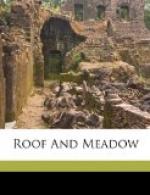THE HUNTING OF THE WOODCHUCK
[Illustration]
THE HUNTING OF THE WOODCHUCK
... the chylde may Rue that ys vn-born, it wos the mor pitte.
There was murder in my heart. The woodchuck knew it. He never had had a thought before, but he had one now. It came hard and heavily, yet it arrived in time; and it was not a slow thought for a woodchuck, either—just a trifle better, indeed, than my own.
This was the first time I had caught the woodchuck away from his hole. He had left his old burrow in the huckleberry hillside, and dug a new hole under one of my young peach-trees. I had made no objection to his huckleberry hole. He used to come down the hillside and waddle into the orchard in broad day, free to do and go as he pleased; but not since he began to dig under the peach-tree.
I discovered this new hole when it was only a foot deep, and promptly filled it with stones. The next morning the stones were out and the cavity two feet deeper. I filled it up again, driving a large squarish piece of rock into the mouth, tight, certainly stopping all further work, as I thought.
There are woodchucks that you can discourage and there are those that you can’t. Three days later the piece of rock and the stones were piled about the butt of the tree and covered with fresh earth, while the hole ran in out of sight, with the woodchuck, apparently, at the bottom of it.
I had tried shutting him out, now I would try shutting him in. It was cruel—it would have been to anything but a woodchuck; I was ashamed of myself for doing it, and went back the following day, really hoping to find the burrow open.
Never again would I worry over an imprisoned woodchuck; but then I should never again try to destroy a woodchuck by walling up his hole, any more than Br’er Fox would try to punish the rabbit by slinging him a second time into the brier-patch.
The burrow was wide open. I had stuffed and rammed the rocks into it, and buried deep in its mouth the body of another woodchuck that my neighbor’s dog had killed. All was cleared away. The deceased relative was gone—where and how I know not; the stones were scattered on the farther side of the tree, and the passage neatly swept of all loose sand and pebbles.
Clearly the woodchuck had come to stay. I meant that he should move. I could get him into a steel trap, for his wits are not abiding; they come only on occasion. Woodchuck lives too much in the ground and too constantly beside his own door to grow very wise. He can always be trapped. So can any one’s enemy. You can always murder. But no gentleman strikes from behind. I hate the steel trap. I have set my last one. They would be bitter peaches on that tree if they cost the woodchuck what I have seen more than one woodchuck suffer in the horrible jaws of such a trap.




